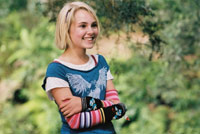There are fantasies, and then there are stories about children who fantasize. There’s a big difference between the two, and Bridge to Terabithia, which concerns two children who invent an imaginary kingdom in a hidden forest, is definitely the latter. But at times the filmmakers seem to think this movie ought to be a full-blown fairy tale, instead; that is certainly how the marketing team has tried to sell it, with posters and trailers that emphasize the special effects and refer to the kingdom of Terabithia as a place that is “discovered” rather than created by the children.
The result is a film that may turn away two of its biggest potential audiences, and for very different reasons. On the one hand, fans of Katherine Paterson’s 30-year-old novel—which emphasizes the importance of children imagining things for themselves—may be turned off by the ads, which are filled with CGI creatures as if to say that children need not worry, the imagining has been done for them. And on the other hand, people who are drawn to the movie by the special effects may be disappointed to find out that the film actually stays fairly true to the book, much of which takes place in a poor farmer’s home and the school his children attend.

Those who take a chance on the film, however, may find it a reasonably mature and even poignant story about friendship, family and tragic loss. It’s about a boy named Jess Aarons (Zathura‘s Josh Hutcherson), who has both artistic and athletic aspirations: he loves to draw, and he wants to be the fastest boy in school. Jess doesn’t get along with any of the other boys, and he doesn’t get along too well with the females in his life, either. Not only is the biggest bully at school a girl by the name of Janice Avery (Lauren Clinton), but Jess is surrounded by sisters: two bossy older ones, one clingy younger one named May Belle (Bailee Madison), and a baby. As Jess puts it, “I’ve got four [sisters], and I’d trade them all for a good dog.”
No sooner has the school year begun, though, than Jess meets a fellow misfit: a girl named Leslie (Because of Winn-Dixie‘s AnnaSophia Robb) who is even better at running and possibly even more creative than he is. Leslie and her parents recently moved in next door to Jess and his family, so it isn’t long before Jess and Leslie start hanging out together—and when they discover a rope dangling over a creek, they use it to swing across to the forest on the other side. Leslie, ever the imaginative one, suggests that she and Jess pretend this forest is a kingdom named Terabithia, and the dilapidated treehouse that they find there becomes their “fortress.”

In the original book, the children’s experiences in Terabithia are described in strictly naturalistic terms; it is often only the dialogue between the children that clues you in to their imaginary world. The author describes the children carrying “sticks,” but Leslie refers to the object in Jess’s hand as a “sword”; in this way, the book tickles the reader’s imagination, just as Leslie awakens Jess’s imagination.
The film, on the other hand, turns Terabithia into a digitally-animated spectacle that invites the viewer to do nothing more than sit back and stare. Terabithia also takes on a strange life of its own. For the most part, it is possible to imagine that the trolls, birds and other creatures that attack the children are simply the product of their fertile imaginations. But there come a few points where the children are surprised—and at one point, even saved—by the actions of these imaginary creatures.

Scenes like these create a sense of genuine peril that doesn’t fit well with the rest of the film. One of the reasons the children have an imaginary kingdom in the first place is because it allows them to face imaginary problems and resolve them easily, in a way that gives them the confidence to face problems in the real world. To an extent, the film “gets” this—the first time the kids encounter a troll in the forest, it is clearly meant to be a metaphor for one of the bullies at school—but then the film makes the metaphor far too literal, by giving the troll the face and personality (and character arc!) of that very same bully. Rather than inform our understanding of the real-world part of the story, this fleshing out of the troll distracts us from it.
Fortunately, director Gabor Csupo—working on his first live-action film, after decades as a producer on cartoons like Rugrats and The Wild Thornberrys—doesn’t get too carried away with the animated effects. Instead, he mostly keeps the focus where it should be, on Jess’s home and school life. Robert Patrick is reasonably gruff but not entirely insensitive as Jess’s dad, and Zooey Deschanel is perfectly cast as Miss Edmunds, the semi-hippie-ish music teacher that Jess has a crush on.

The film taps into spiritual themes, too, though not as well as it could have—which becomes a bit of a liability when the story turns tragic. In the book, Leslie is a fan of the Narnia books but doesn’t know anything about Jesus until she visits the Easter service at Jess’s church; what’s more, Leslie is moved to an almost mystical sort of awe in the forest, and so she and Jess “pray” to the “spirits” there, just as they battle giants and the like in their imaginations. There is a sense in the book that Leslie’s fantasies are rooted in a deeper sort of longing. But the film leaves most of this out, and could almost give one the impression that churches and stained-glass windows are little more than nice add-ons to an already active imagination.
Despite its flaws, Bridge to Terabithia is a decent adaptation of Paterson’s novel, and at times it is quite moving. I say this, incidentally, as a long-time fan of the book who bought a copy with my paper-route money after my teacher read it to our class a quarter-century ago. There are plenty of things the filmmakers could have done differently, but on a certain primal level, this film gets much of the story right.
Talk About It
Discussion starters- Leslie remarks that Jess and May Belle have to believe in Jesus but don’t like the story of his death and resurrection, whereas Leslie doesn’t have to believe in Jesus but does like the story. Do you like the story? Do you think you have to? Would you like it more if you didn’t think you had to?
- Leslie, waving her arms at the world in general, says, “I seriously do not think God goes around damning people to hell. He’s too busy running all this!” How would you answer Leslie? Does God “go around” condemning people? What would you say to Jess when he says he is worried that someone he knows has gone to hell?
- A recurring theme in the film is to “close your eyes and keep your mind wide open.” How open should a mind be? How do you know if it is too open?
- How did your attitudes towards the characters change over the course of the film? How do the attitudes of the characters toward each other change? Point to specific examples, such as Leslie’s relationship with Janice, or Jess’s with May Belle.
The Family Corner
For parents to considerBridge to Terabithia is rated PG for thematic elements including bullying (a few threatened punches), some peril (imaginary creatures attack the children, someone falls from a tree) and mild language (a few “damns” and the like). A major character dies, but the death is kept completely offscreen; we don’t even see the body afterwards. Characters discuss whether God sends people to Hell.
Photos © Copyright Walt Disney Pictures
Copyright © 2007 Christianity Today. Click for reprint information.
What Other Critics Are Saying
compiled by Jeffrey Overstreet from Film Forum, 02/22/07Katherine Paterson, like Madeleine L’Engle, is a Christian writer who crafts poignant stories about young people who struggle with serious issues and then make sense of their world through vivid imagination and flourishes of fantasy.
But critics are cautioning audiences that the first feature film based on Paterson’s work, Bridge to Terabithia, is not The Lion, the Witch, and the Wardrobe. It’s a story about a remarkable friendship between two young people who weave a world of imagination that helps them cope with daily hardships.
Michael Brunk (Past the Popcorn) raves, “Happily, this may be among the best translations of a book to the big screen that I have seen, and I don’t say that lightly. This is a very, very good thing in the case of Bridge to Terabithia, serving to introduce this heart-warming tale to new generations of readers. Adults will also likely find the movie just as engrossing as children. … There is a message here about strength of character and the value of friendship—and yes, love—that can’t help but leave a lasting impression with audience members.”
David DiCerto (Catholic News Service) says, “The young leads are charming and the sweet story imparts worthy messages about friendship and the power of imagination. Also, there is a strong affirmation of family and the depictions of authority figures are consistently positive. … But narratively, the movie, faithfully adapted by the author’s son, David Paterson, is a bit of a letdown, as the anticipated fantastical elements are marginal. The closing five minutes deliver a sense of wonder and enchantment that director Gabor Csupo spreads too thinly throughout the rest of the film.”
Jeremy Lees (Plugged In) says, “Bridge to Terabithia is one of the more character-driven fantasy movies I’ve seen. To watch its magical kingdom take a backseat to the story’s real-world personalities is a refreshing departure from most middle-of-the-road examples of the genre (not Narnia) wherein campy dialogue serves only to inspire the hero for his next battle sequence, in which he’ll learn an important lesson about—you guessed it—bravery. Put simply, there’s more to explore here than in eight Eragons.” But he’s not too happy about what the film implies about the kingdom of God—which is interesting, since the book’s author is a Christian.
Christa Banister (Crosswalk) likes the film’s “extraordinary characterization. … Much likeCharlotte’s Web, [this movie] isn’t just happy-go-lucky, family-friendly entertainment. In a surprising plot twist, it explores some darker themes … that will certainly provoke some post-movie discussion. Despite the bittersweet turn of events, however, the resolution isn’t what most would probably expect, which makes the movie, not to mention the young actors’ performances, even more emotionally affecting and powerful.”
Mainstream critics are surprised by the meaningful and poignant storytelling, even if they do have some complaints.












